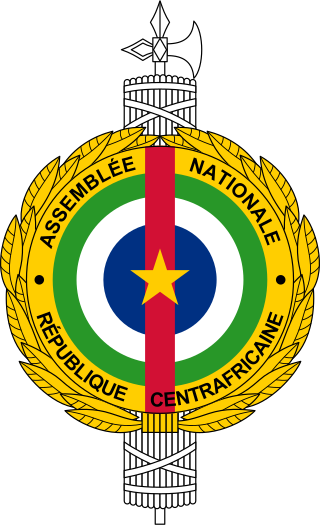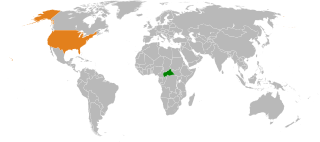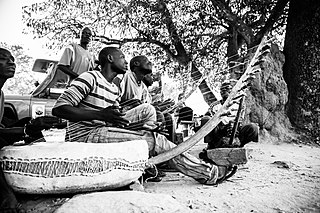This article relies largely or entirely on a single source .(April 2021) |

The ngombi is a traditional musical instrument from Central Africa.
This article relies largely or entirely on a single source .(April 2021) |

The ngombi is a traditional musical instrument from Central Africa.
It is an arched harp. [1]

The Central African Republic (CAR), formerly known as Ubangi-Shari, is a landlocked country in Central Africa. It is bordered by Chad to the north, Sudan to the northeast, South Sudan to the east, the Democratic Republic of the Congo to the south, the Republic of the Congo to the southwest, and Cameroon to the west. The Central African Republic covers a land area of about 620,000 square kilometres (240,000 sq mi). As of 2021, it had an estimated population of around 5.5 million. As of 2023, the Central African Republic is the scene of a civil war, which is ongoing since 2012.

The economy of the Central African Republic is $2.321 billion by gross domestic product as of 2019, with an estimated annual per capita income of just $805 as measured by purchasing power parity in 2019.

The Central African Empire was established on 4 December 1976 when the then-President of the Central African Republic, Jean-Bédel Bokassa, declared himself Emperor of Central Africa. The empire would be dissolved less than three years later when French and Central African forces overthrew Bokassa and re-established the Central African Republic on 21 September 1979.

Music of the Central African Republic includes many different forms. Western rock and pop music, as well as Afrobeat, soukous and other genres have become popular nationwide. The sanza is a popular instrument.

Central Africa is a subregion of the African continent comprising various countries according to different definitions. Middle Africa is an analogous term used by the United Nations in its geoscheme for Africa and consists of the following countries: Angola, Burundi, Cameroon, Central African Republic, Chad, Democratic Republic of the Congo, Republic of the Congo, Equatorial Guinea, Gabon, Rwanda, and São Tomé and Príncipe. These eleven countries are members of the Economic Community of Central African States (ECCAS). Six of those countries are also members of the Economic and Monetary Community of Central Africa (CEMAC) and share a common currency, the Central African CFA franc.

Pygmy music refers to the sub-Saharan African music traditions of the Central African foragers, predominantly in the Congo, the Central African Republic and Cameroon.

The Central African Republic national football team, nicknamed Les Fauves, is the national team of the Central African Republic and is controlled by the Central African Football Federation. They are a member of CAF. Despite being traditionally one of the weakest teams in Africa and the world, they recently achieved success. They won the 2009 CEMAC Cup by beating Gabon in the semi-finals and Equatorial Guinea in the final 3–0. Their FIFA ranking rose from 202nd in August 2010 to 89th by July 2011. On 10 October 2010, they earned a shock 2012 Africa Cup of Nations qualifier win at home against Algeria 2–0, which put them top of their qualification group. The team won its first FIFA World Cup qualifier on 2 June 2012 after beating Botswana 2–0 at home.

The National Assembly is the lower house of the Parliament of the Central African Republic. Members are elected in single-member constituencies using the two-round system. Members serve five-year terms.

West Africa Time, or WAT, is a time zone used in west-central Africa. West Africa Time is one hour ahead of Coordinated Universal Time (UTC+01:00), which aligns it with Central European Time (CET) during winter, and Western European Summer Time (WEST) / British Summer Time (BST) during summer.

Central African Republic–United States relations are the international relations between Central African Republic and the United States of America. The relations have generally been positive, although concerns over the pace of political and economic liberalization and human rights have affected the degree of support provided by the United States to the Central African Republic.
The Gabonese people have forged since the independence of the country, in 1960, their own culture which is neither the traditional culture of the different ethnic groups which compose it, nor modern Western culture. It is a culture in movement, a mixture of diversity and common traits, bringing together the most diverse beliefs and practices.

The Republic of the Congo, also known as Congo-Brazzaville, the Congo Republic or simply either Congo or the Congo, is a country located on the western coast of Central Africa to the west of the Congo River. It is bordered to the west by Gabon, to its northwest by Cameroon and its northeast by the Central African Republic, to the southeast by the Democratic Republic of the Congo, to its south by the Angolan exclave of Cabinda and to its southwest by the Atlantic Ocean.

African Harps, particularly arched or "bow" harps, are found in several Sub-Saharan African music traditions, particularly in the north-east. Used from early times in Africa, they resemble the form of harps in ancient Egypt with a vaulted body of wood, parchment faced, and a neck, perpendicular to the resonant face, on which the strings are wound.

Christianity is the predominant religion in Central African Republic, with significant minorities of the adherents of Islam and Traditional African religions.

Central African cuisine includes the cuisines, cooking traditions, practices, ingredients and foods of the Central African Republic (CAR). Indigenous agriculture in the country includes millet, sorgum, banana, yam, okra, yellow onion, garlic, spinach, rice and palm oil. Imported crops of American origin include maize, manioc (cassava), peanuts, chili peppers, sweet potato and tomato. Additional foods include onions, garlic, chiles and peanuts.

The Central African Republic Civil War is an ongoing civil war in the Central African Republic (CAR) involving the government, rebels from the Séléka coalition, and Anti-balaka militias.

Visitors to the Central African Republic must obtain a visa from one of the Central African Republic diplomatic missions or French diplomatic missions unless they come from one of the visa exempt countries.

Gabon sent a delegation to compete at the 2016 Summer Paralympics in Rio de Janeiro, Brazil, from 7–18 September 2016. This was the nation's third appearance at a Summer Paralympic Games, following their two previous participations at the 2008 Summer Paralympics and the 2012 Summer Paralympics. Gabon sent a sole athlete to represent them at Rio de Janeiro, wheelchair racer Edmond Ngombi. He did not advance from his heat in the men's 100 metres T54 event as he came sixth out of seven competitors and attributed the result to a handlebar problem.